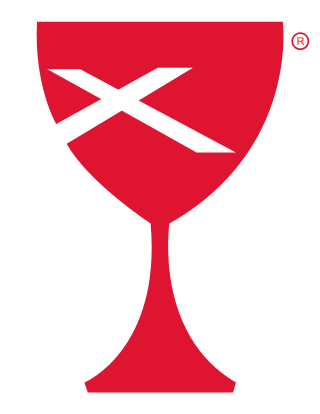
The Christian Church (Disciples of Christ) is a mainline Protestant Christian denomination in the United States and Canada. The denomination started with the Restoration Movement during the Second Great Awakening, first existing during the 19th century as a loose association of churches working towards Christian unity, then slowly forming quasi-denominational structures through missionary societies, regional associations, and an international convention. In 1968, the Disciples of Christ officially adopted a denominational structure at which time a group of churches left to remain nondenominational.

Ecumenism – also called interdenominationalism, or ecumenicalism – is the concept and principle that Christians who belong to different Christian denominations should work together to develop closer relationships among their churches and promote Christian unity. The adjective ecumenical is thus applied to any non-denominational initiative that encourages greater cooperation and union among Christian denominations and churches.
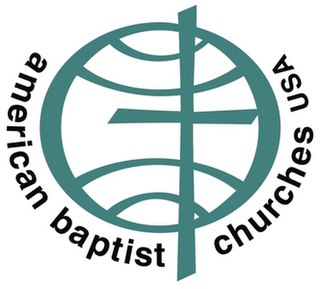
The American Baptist Churches USA (ABCUSA) is a Baptist Christian denomination established in 1907 originally as the Northern Baptist Convention, and from 1950 to 1972 as the American Baptist Convention. It traces its history to the First Baptist Church in America (1638) and the Baptist congregational associations which organized the Triennial Convention in 1814.

The United Church of Christ (UCC) is a socially liberal mainline Protestant Christian denomination based in the United States, with historical and confessional roots in the Congregational, Restorationist, Continental Reformed, and Lutheran traditions, and with approximately 4,600 churches and 712,000 members.The UCC is a historical continuation of the General Council of Congregational Christian churches founded under the influence of New England Puritanism. Moreover, it also subsumed the third largest Calvinist group in the country, the German Reformed. Notably, its modern members' theological and socio-political stances are often very different from those of its predecessors.
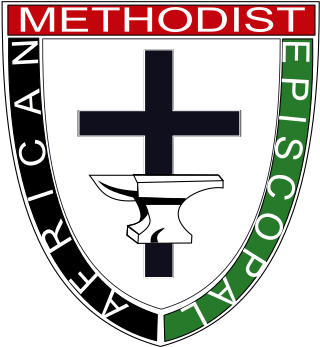
The African Methodist Episcopal Church, usually called the AME Church or AME, is a Methodist Black church. It adheres to Wesleyan-Arminian theology and has a connexional polity. The first independent Protestant denomination to be founded by Black people, AME welcomes and has members of all ethnicities.
The Confessing Movement is a largely lay-led theologically conservative Christian movement that opposes the influence of theological liberalism and theological progressivism currently within several mainline Protestant denominations and seeks to return them to its view of orthodox doctrine, or form a new denomination and disfellowship (excommunicate) them if the situation becomes untenable. Those who eventually deem dealing with theological liberalism and theological progressivism within their churches and denominations as not being tenable anymore would later join or start Confessional Churches and/or Evangelical Churches that continue with the traditions of their respective denominations and maintaining orthodox doctrine while being ecclesiastically separate from the Mainline Protestant denominations.

The Congregational Christian Churches was a Protestant Christian denomination that operated in the U.S. from 1931 through 1957. On the latter date, most of its churches joined the Evangelical and Reformed Church in a merger to become the United Church of Christ. Others created the National Association of Congregational Christian Churches or joined the Conservative Congregational Christian Conference that formed earlier in 1945. During the forementioned period, its churches were organized nationally into a General Council, with parallel state conferences, sectional associations, and missionary instrumentalities. Congregations, however, retained their local autonomy and these groups were legally separate from the congregations.

The Chicago Theological Seminary (CTS) is a Christian ecumenical American seminary located in Chicago, Illinois, and is one of several seminaries historically affiliated with the United Church of Christ. It is the oldest institution of higher education in Chicago, originally established in 1855 under the direction of the abolitionist Stephen Peet and the Congregational Church by charter of the Illinois legislature.
The United Church of Christ is a Christian denomination. Periodically, bodies within the United Church of Christ issue resolutions for various reasons. These statements may or may not be representative of the United Church of Christ. This article documents notable resolutions from the various formal bodies of the United Church of Christ.
Justice and Witness Ministries (JWM) is one of five covenanted ministries of the United Church of Christ. JWM is responsible for national office ministries related to four areas: economic justice; "human rights, justice for women and transformation;" "public life and social policy;" and "racial justice".
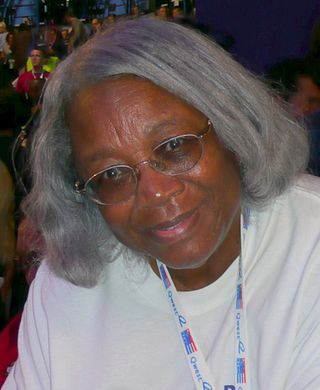
Yvonne Bond Miller was a Virginia educator and American politician who became the first African-American woman to serve in both houses of the Virginia General Assembly. A Democrat, in 1983 Miller became the first African-American woman elected to the state house, where she served for four years before winning election to the state Senate, where she consistently won re-election until her death in office. Miller taught in the Norfolk Public schools, and later taught early and childhood education at one of her alma maters, which had become Norfolk State University during her lifetime.
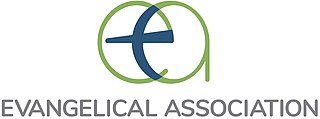
The Evangelical Association of Reformed and Congregational Christian Churches is an evangelical protestant denomination in the United States. It began as a fellowship of churches disaffected from the United Church of Christ due to that denomination's liberal theology. Churches of the Evangelical Association are free to hold dual affiliation with another denomination, as local churches observe congregational polity.
Alison Mary Cheek was an Australian-born American religious leader. She was one of the first women ordained in the Episcopal Church in the United States and the first woman to publicly celebrate the Eucharist in that denomination.
Gabriel Joseph Fackre (1926–2018) was an American theologian and Abbot Professor of Christian Theology Emeritus at Andover Newton Theological School in Newton, Massachusetts. He was on the school's faculty for 25 years before retiring in 1996. Previous to that he was Professor of Theology and Culture at Lancaster Theological Seminary in Pennsylvania, teaching there from 1961 through 1970. Fackre has also served as visiting professor or held lectureships at 40 universities, colleges, and seminaries. His papers are housed in Special Collections at Princeton Theological Seminary Libraries, Princeton, New Jersey.
The Kansas City Statement of Faith is a 1913 confession of faith adopted by the National Council of the Congregational Churches of the United States at Kansas City, Missouri. This concise statement of Congregational beliefs restates traditional congregational polity and endorses ecumenism, while also displaying the drift away from Reformed theology that had occurred in American Congregationalism.

Sharon E. Watkins is an ordained Christian minister who became the first woman to lead a mainline denomination in North America in 2005, when she was elected the General Minister and President of the Christian Church in the United States and Canada. She served two six year terms. She preached at the national prayer service on January 21, 2009, at the invitation of President Barack Obama, becoming the first woman to preach at an inaugural prayer service. In 2017, after stepping down from the role of General Minister and President of the Christian Church, she became director of the Truth and Racial Justice Initiative of the National Council of Churches of Christ, USA. She is currently the pastor of Bethany Memorial Church, in Bethany, West Virginia.
John C. Dorhauer is an American Protestant clergy member, author, and theologian who served as the ninth General Minister and President (GMP) of the United Church of Christ (UCC), a Mainline Protestant denomination, from June 30, 2015, through July 2023.

Rachel Henderlite was an American religious leader who was the first woman to be ordained a pastor of the Presbyterian Church in the United States (PCUS), which later merged with the United Presbyterian Church in the United States of America (1983) to become the Presbyterian Church U.S.A. She held professorships at several American colleges and seminaries, wrote six books, and was active in various ecumenical efforts.
Carnella Barnes was an African-American ordained minister in the Christian Church denomination. She was one of the first women ordained in the denomination. She served as director of the Avalon Community Center, in Los Angeles, California, for thirteen years. She served as president of the Los Angeles Church Women United, and was the first black woman to be elected president of the International Christian Women's Fellowship in the Christian Church. She was also an advocate for senior citizens, and established the first AARP chapter in Los Angeles.

William Sterling Cary was an American Christian minister. From 1972 to 1975, he was the first Black president of the National Council of Churches (NCC) in its history.












